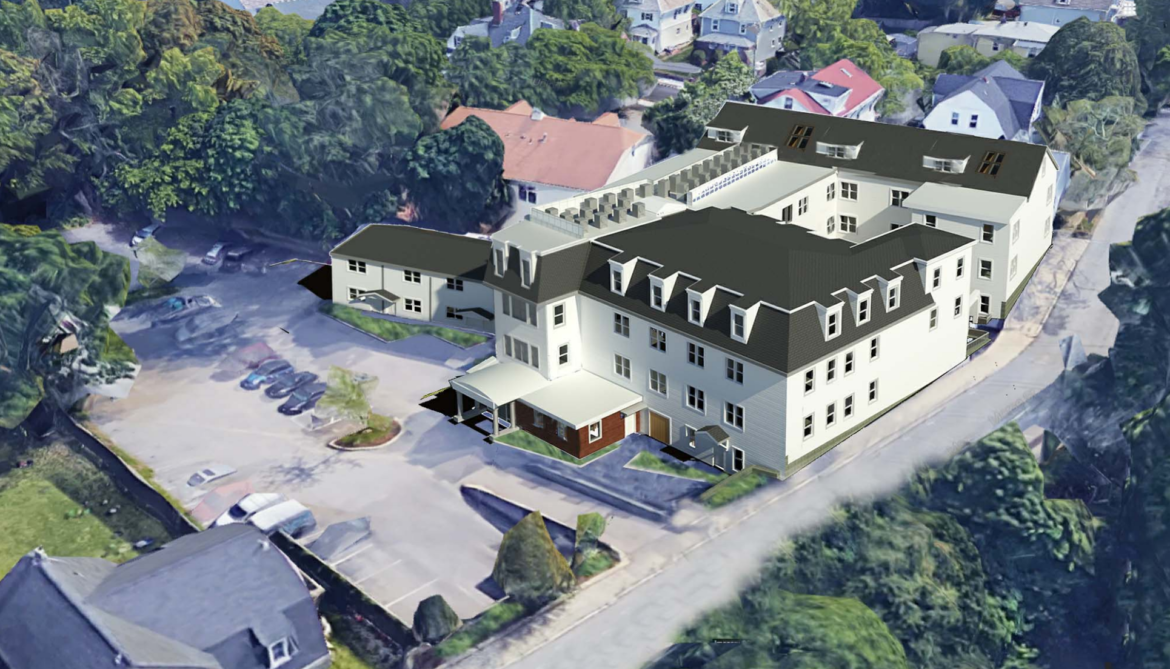
A rendering of 101-103 Morse Street, which developers want to convert from a commercial building into an apartment building
The Zoning Board of Appeals told developers looking to change a former massage school into an apartment complex that their plan needs more work before it can get approval.
The complex at 101-103 Morse Street, south of the Charles River in Watertown, most recently was occupied by the Cortiva Institute, but when the massage school left property owner Kamran Shahbazi decided to change it into a residential building.
The current plan calls for 44 apartments – 3 studios, 32 one-bedrooms, nine two-bedrooms and one three-bedroom – to be constructed. This is down from 49.
One of the main complaints the ZBA had about the plan was a lack of information and clarity in the plans submitted by the developers, including images of what it would look like, more detailed architectural plans and descriptions of the project.
Residents and ZBA members worried about the high number of units, parking and traffic.
ZBA member Christopher Heep said he worries about the impact of the complex on the neighborhood, and said it does not have features often seen with other projects.
“I am concerned with the number of residential units proposed here given the neighborhood and the zoning district we are operating under,” Heep said. “It does seem as though the property doesn’t carry with it much in the way of site improvements, landscaping or open space – the kinds of thing this a board might point to as a offsetting the impacts of this sort of project might have.”
Architect Gary Hendren said there will be fewer car trips with a residential property than when it was a massage school.
“Cortiva had 300 to 320 students at any one time, they weren’t all at the same time, they had 60-70 students at one time,” Hendren said. “And there were other commercial tenants. Cortiva had another group of spaces at Hibernian Hall (on Watertown Street).”
Councilor Lisa Feltner said she has heard from residents that they worry about the new use of the site, and what it might mean for their neighborhood.
“People aren’t against it being residences, but they are concerned with the number of units and there is what’s on paper and reality of what happens,” Feltner said. “(The massage school) was not in session in the summer, and there 58 students at a time, people said, ya, but they left, they didn’t have overnight activity all the time.”
The site has 40 parking spaces, but some worry that number is not enough.
Shahbazi said the parking will be unbundled, meaning residents don’t have to have a parking spot, and if they want one they will pay extra for one.
Town Councilor Angeline Kounelis said that unbundled parking is a new thing in Watertown, and she wants more information about how the program will work.
“How is it going to be monitored, is a new program we need to have specifics about the who, when, whats, and ifs,” Kounelis said. “Young people will have guests. It is important to monitor, we don’t want to have spill over into neighborhood streets.”
Cars will be registered by license plate and complex management, which Shahbazi said he will lead personally, and management will monitor the parking lot.
ZBA member Jason Cohen said it looks like developers have “shoe horned” parking spaces into the lot, and he said there are two next to a garbage dumpster that make it look like the trash would not be able to be collected with the cars there.
Feltner raised the issue of the 15 parking spots on a town-owned easement. She noted that the easement expired. She said she would like to see some open space created, or perhaps the developer could give money to the town to improve Casey Park, which sits next to the back of the property.
ZBA Chairwoman Melissa Santucci Rozzi said because the developers don’t own the land, they cannot turn it into open space, and the ZBA cannot require them to do so.
While the number of affordable housing units – seven – will remain the same even with the reduction of the number of units, the will be oddly shaped. Santucci Rozzi worried that they would be substandard units. Watertown Senior Planner Andrea Adams said town officials fretted over that question, and decided that since they are the same as other units in the complex that they would be acceptable.
The board voted to continue the case until the May meeting.